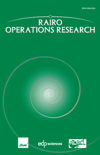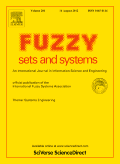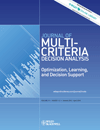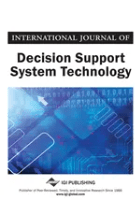
JOURNAL OF MULTIPLE-VALUED LOGIC AND SOFT COMPUTING
metrics 2024
Unlocking New Dimensions in Mathematical Logic.
Introduction
Journal of Multiple-Valued Logic and Soft Computing, published by Old City Publishing Inc, is a dedicated forum for advancing the fields of logic and soft computing. Since its inception in 2003, this journal has positioned itself as a valuable resource for researchers, professionals, and students interested in the complex interplay between multiple-valued logic systems and computational methodologies. With a broader reach into theoretical computer science, the journal is categorized in the Q4 quartiles across key areas, showcasing its role in disseminating relevant research despite its current position. This peer-reviewed publication silos essential discussions and breakthroughs that serve as a foundation for ongoing innovation in logic and computing theories. Though not currently open access, the journal continues to attract critical contributions that underscore its commitment to advancing knowledge in mathematical logic and software development through its effective symposium-like format, promoting collaboration among various stakeholders in the scientific community.
Metrics 2024
 0.25
0.25 0.70
0.70 0.80
0.80 29
29Metrics History
Rank 2024
Scopus
IF (Web Of Science)
JCI (Web Of Science)
Quartile History
Similar Journals

SOFT COMPUTING
Fostering Interdisciplinary Collaboration for a Smarter FutureSOFT COMPUTING is a premier international journal published by Springer, focusing on the interdisciplinary field of soft computing, which includes areas such as fuzzy logic, neural networks, genetic algorithms, and their applications. With an ISSN of 1432-7643 and E-ISSN 1433-7479, the journal is based in Germany and contributes significantly to the advancement of knowledge in its fields, boasting an impressive Scopus ranking that places it in the top echelons of Geometry and Topology, Theoretical Computer Science, and Software categories. In the 2023 category quartiles, it has achieved Q2 rankings in multiple disciplines, reflecting its high-quality research contributions. Though not Open Access, the journal's rigor and relevance to contemporary issues make it a favored resource for researchers, professionals, and students alike. From its inception in 2000 and spanning across the years until 2024, SOFT COMPUTING continues to serve as a robust platform for innovative research and theoretical advancements, making it an essential read for anyone engaged in the rapidly evolving landscape of computational intelligence.

RAIRO-OPERATIONS RESEARCH
Elevating knowledge in management science for a dynamic world.RAIRO-Operations Research is a distinguished journal published by EDP Sciences S A, focusing on the intricate fields of operations research, management science, and computer science applications. Established in 1977, this French-based journal encompasses a rich legacy of contributing to theoretical advancements and practical applications that equip researchers, professionals, and students with the insights necessary to navigate complex decision-making environments. With a notable Scopus ranking in various categories, including a Q3 position in Computer Science Applications, Management Science and Operations Research, and Theoretical Computer Science, the journal aims to foster innovation and share impactful research findings. As an insightful platform, RAIRO-Operations Research is essential for those seeking to deepen their understanding and enhance their expertise in operational methodologies, while also offering a range of access options for its wide readership. Delve into the journal to explore transformative research that pushes the boundaries of operations research.

FUZZY SETS AND SYSTEMS
Bridging Theory and Practice in Fuzzy SetsFuzzy Sets and Systems, published by Elsevier, is a leading international journal that delves into the intricate field of fuzzy logic and its applications in various domains, including artificial intelligence and computational mathematics. With a significant impact within its categories—ranking Q2 in Artificial Intelligence and Q1 in Logic for 2023—this journal offers a robust platform for scholars to share cutting-edge research and developments. Focusing on the application of fuzzy set theory to enhance decision-making processes, modeling, and data analysis, it caters to a diverse audience of researchers, industry professionals, and advanced students. The journal's rigorous review process and prestigious ranking, evidenced by its impressive Scopus metrics—2nd in Mathematics & Logic and 120th in Computer Science—underscore its importance in the academic landscape. Contributors are encouraged to explore innovative methodologies, theoretical advancements, and interdisciplinary approaches. Fuzzy Sets and Systems continues to serve as a vital resource for advancing knowledge and fostering collaboration within the fuzzy logic community.

Journal of Multi-Criteria Decision Analysis
Navigating Complexity, Empowering DecisionsThe Journal of Multi-Criteria Decision Analysis (JMCDM) is a distinguished academic publication dedicated to the interdisciplinary field of decision sciences and management strategies. Published by WILEY, this journal has been a vital resource for researchers and practitioners looking to enhance their understanding of complex decision-making processes since its inception in 1992. The journal is recognized for its rigorous peer-review process and currently holds a Q3 ranking in Decision Sciences (miscellaneous) and a Q2 ranking in Strategy and Management, highlighting its significant contributions to the field. With impressive Scopus rankings, including Rank #19 in General Decision Sciences, JMCDM provides a platform for innovative research that influences theory and practice alike. Although not completely open access, it maintains a robust electronic presence through its E-ISSN: 1099-1360. Researchers, professionals, and students can expect to find comprehensive analyses, methodological advancements, and diverse case studies that support informed decision-making in a variety of contexts.

Malaysian Journal of Mathematical Sciences
Exploring New Dimensions: Your Gateway to Mathematical ResearchMalaysian Journal of Mathematical Sciences, published by UNIV PUTRA MALAYSIA PRESS, serves as a prominent platform for the dissemination of innovative research in the field of mathematics. With an ISSN of 1823-8343 and spanning from 2007 to 2024, this journal places a particular emphasis on general mathematics while welcoming contributions that touch on various interdisciplinary applications. Despite its current positioning in Q4 of the mathematics category and ranking #239 out of 399 in Scopus, the journal actively aims to enhance the visibility and impact of mathematical research within Malaysia and the broader academic community. It provides crucial access to emerging ideas, making it an essential resource for researchers, professionals, and students eager to stay abreast of contemporary developments in mathematical sciences. The journal's commitment to open access ensures that findings are readily available to a global audience, fostering collaboration and discussion among scholars worldwide.

TWMS Journal of Applied and Engineering Mathematics
Transforming Ideas into Solutions in Applied MathematicsTWMS Journal of Applied and Engineering Mathematics, published by TURKIC WORLD MATHEMATICAL SOC, is a distinguished open-access journal that has been contributing to the field of applied mathematics since 2011. With a focus on theoretical and practical applications spanning various areas including Computational Mathematics, Control and Optimization, and Numerical Analysis, this journal serves as a vital resource for researchers and professionals looking to disseminate and access quality research. Although currently positioned in the Q4 quartile across several mathematical categories in 2023, the journal aims to provide a platform for innovative research, fostering collaboration and knowledge sharing among scholars worldwide. Located in Turkey, this journal emphasizes accessible content, inviting a diverse audience to explore breakthroughs and advancements in mathematical sciences. With its broad spectrum of topics, TWMS Journal not only enriches academic discourse but also plays a crucial role in supporting the development of new methodologies and technologies in engineering and applied mathematics.

International Journal of Intelligent Computing and Cybernetics
Advancing the Frontiers of Intelligent Computing and CyberneticsThe International Journal of Intelligent Computing and Cybernetics, published by EMERALD GROUP PUBLISHING LTD, serves as a pivotal platform for advancing the field of intelligent computing and cybernetics since its inception in 2008. With a strong focus on innovative research and interdisciplinary collaboration, this journal is positioned in the prestigious Q2 category of Computer Science, ranking at an impressive 42nd out of 232 in Scopus, reflecting an 82nd percentile performance. The journal provides a venue for scholars and practitioners to disseminate their findings on cutting-edge technologies and methodologies that bridge the realms of computing, artificial intelligence, and cybersecurity. Although currently not an open-access journal, it widely circulates valuable insights essential for driving forward academic discourse and practical applications in the rapidly evolving digital landscape. Researchers, professionals, and students are encouraged to engage with this journal to stay at the forefront of advancements in intelligent systems and cybernetic solutions.

Decision
Exploring the Dynamics of Decision-MakingDecision is a prestigious journal published by Springer, focusing on the multifaceted field of decision-making processes across various domains such as psychology, economics, management, and social sciences. With the ISSN 0304-0941 and E-ISSN 2197-1722, this journal serves as a critical platform for the dissemination of high-quality research articles, providing insights into theoretical frameworks and empirical studies that shape our understanding of decision-making. Although currently not open access, articles may be available through institutional subscriptions, ensuring that a wide audience can engage with the latest findings in the field. The journal's commitment to enhancing scholarly communication and its rigorous peer-review process underscore its importance in fostering a deeper understanding of the complexities within decision sciences. Researchers, professionals, and students are encouraged to contribute and stay informed through this essential resource located at One New York Plaza, Suite 4600, New York, NY 10004, United States.

Axioms
Unlocking the World of Mathematics for Everyone.Axioms is a distinguished open-access journal published by MDPI since 2012, dedicated to the field of mathematics. Based in Switzerland, it serves as a platform for the dissemination of high-quality research across various domains including Algebra, Number Theory, Analysis, Geometry, Topology, Logic, and Mathematical Physics. With an impressive Q3 ranking across multiple categories in the 2022 classification, Axioms maintains a robust presence in the academic community, reflected in its Scopus rankings which position it favorably within the top percentiles of its respective fields. The journal aims to facilitate open and rapid access to groundbreaking theoretical advancements and practical applications, making it an invaluable resource for researchers, professionals, and students alike. Researchers are encouraged to contribute their findings to foster innovative discussions and collaborations in the mathematical sciences.

International Journal of Decision Support System Technology
Advancing Knowledge in Decision Support Technologies.International Journal of Decision Support System Technology, published by IGI Global, is a leading publication in the field of decision support systems, bridging the gap between theoretical advancements and practical applications. With its ISSN 1941-6296 and E-ISSN 1941-630X, this journal has been a prominent platform for researchers and professionals since its inception in 2009. Covering a wide range of topics within the realms of Computer Science and Modeling and Simulation, it currently holds rankings of Q3 and Q4, respectively, in the 2023 category quartiles. The journal is committed to disseminating innovative research that enhances decision-making processes through advanced computational techniques. Even without an open access option, it maintains a robust academic presence and aims to foster collaboration among scholars, making it an invaluable resource for students and professionals eager to stay at the forefront of technology and decision-making methodologies. With a focus on accessibility and relevance, the International Journal of Decision Support System Technology continues to shape the future of decision support research.